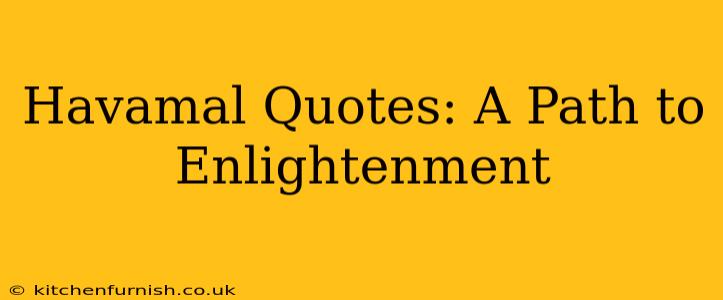The Hávamál ("Sayings of the High One"), a section within the Poetic Edda, offers profound wisdom on life, conduct, and self-improvement. These ancient Norse proverbs, attributed to Odin, the Allfather, resonate even today, providing guidance on navigating the complexities of human existence. This exploration delves into select Hávamál quotes, unpacking their meaning and revealing their timeless relevance for achieving personal enlightenment. We will dissect these powerful sayings, illuminating their practical applications in modern life and exploring their continued capacity to inspire spiritual growth.
What are the main themes in the Havamal?
The Hávamál is a diverse collection of verses, but several core themes emerge consistently. These include: wisdom and knowledge, emphasizing the importance of learning from experience and seeking counsel; social conduct and ethics, outlining appropriate behavior in various social situations and stressing the importance of hospitality and trustworthiness; self-reliance and resilience, highlighting the need for inner strength and the ability to overcome challenges; and survival and practical skills, offering advice on practical matters like travel, hospitality, and self-defense. These interwoven themes contribute to a holistic understanding of life, offering a path toward self-improvement and a more fulfilling existence. Understanding these themes unlocks the deeper meaning behind the individual quotes.
What are some of the most famous quotes from the Havamal?
Many powerful verses from the Hávamál have endured through time. Let's explore some of the most well-known and their interpretations:
"A friend to a friend is a friend indeed." (This is a paraphrase, as the original is more nuanced).
This seemingly simple statement underscores the importance of genuine and reciprocal relationships. It speaks to the value of loyalty, trust, and mutual support. In a world often characterized by fleeting connections, this proverb serves as a reminder to cultivate meaningful relationships built on honesty and shared values. The original Old Norse is richer, suggesting the bond strengthens with time and tested loyalty. It's not just about fleeting friendship but a deep, enduring connection.
"He who is wise, does not speak much.”
This quote advocates for mindful communication. It doesn't advocate for silence, but rather for choosing words carefully and avoiding idle chatter. True wisdom, according to the Hávamál, is often expressed through actions rather than excessive speech. This reflects the idea that thoughtful reflection and considered action are more valuable than superficial words.
“A guest should be treated well for three nights and, if he stays longer, given a gift, or, better, money to help him on his way.”
This verse highlights the importance of hospitality and generosity. It's a practical instruction, but it also speaks to a larger principle of treating others with kindness and respect, regardless of their circumstances. It reflects the strong sense of community and mutual support found within Norse culture. The gift or money isn't merely transactional; it represents a symbolic sending-off, wishing them well on their journey.
"More valuable than gold, the heart's wisdom; and more than silver, a good heart."
This quote prioritizes character over material wealth. It asserts that inner qualities like wisdom, compassion, and integrity are far more valuable than any material possessions. This emphasizes the importance of cultivating inner virtue and focusing on personal growth. It's a timeless message relevant in any era, reminding us that true richness lies in character.
How can I apply the wisdom of the Havamal to my life?
The wisdom contained within the Hávamál is surprisingly relevant to modern life. By reflecting on these proverbs and considering their implications, we can cultivate a more mindful and fulfilling existence. For example, the emphasis on self-reliance can encourage personal responsibility and resilience in the face of challenges. The focus on social ethics can improve our interactions with others, fostering stronger and more meaningful relationships. The advice on practical matters can inform our daily decisions and provide guidance in navigating everyday life. The Hávamál isn't merely a historical document; it's a living source of wisdom that can enrich our lives today.
What other Norse myths and sagas offer similar insights?
While the Hávamál is a rich source of wisdom, similar insights can be found in other Norse myths and sagas. The Poetic Edda as a whole offers a wealth of proverbs and philosophical reflections. Stories about the gods and heroes often illustrate ethical dilemmas and offer lessons about courage, honor, and perseverance. Exploring these texts can provide further context and a deeper understanding of the values embedded in Norse mythology. For instance, the stories of Odin's trials and tribulations highlight the value of perseverance and self-sacrifice in the pursuit of knowledge and self-improvement.
By engaging with the Hávamál's timeless wisdom, we can find practical guidance and spiritual nourishment. These powerful verses offer a path to self-awareness, personal growth, and a more meaningful life. The messages contained within them continue to resonate, proving their enduring relevance in the modern world.

